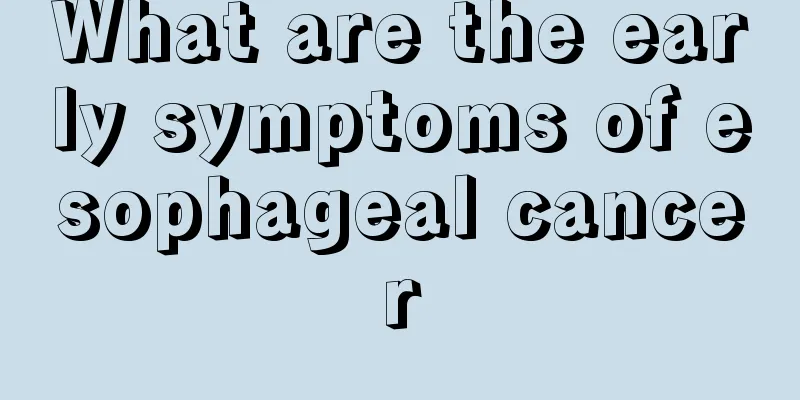What are the early symptoms of esophageal cancer

|
Early symptoms of esophageal cancer include difficulty swallowing, chest pain and weight loss, and timely medical treatment is key. Early detection can be confirmed through endoscopy, imaging and biopsy, and treatment includes surgery, radiotherapy and chemotherapy. 1. Dysphagia is the most common early symptom of esophageal cancer. Patients may feel that food is stuck in the throat or chest, especially solid food. As the disease progresses, liquids may also be difficult to swallow. This symptom is usually related to the growth of tumors in the esophagus, which leads to narrowing of the lumen. It is recommended to perform an endoscopic examination as soon as possible when dysphagia occurs to confirm the diagnosis. 2. Chest pain is another common symptom, which may manifest as persistent pain or discomfort behind the sternum or in the upper abdomen. This pain may be related to the invasion of surrounding tissues or nerves by the tumor. Chest pain may also be a manifestation of acid reflux or esophagitis, but if it persists, you need to be alert to the possibility of esophageal cancer. Imaging tests such as CT or MRI can help assess the extent of the tumor. 3. Weight loss is one of the typical symptoms of esophageal cancer, which is usually related to reduced food intake and tumor consumption caused by dysphagia. Patients may experience significant weight loss in a short period of time, accompanied by symptoms such as fatigue and loss of appetite. Nutritional support is very important during the treatment process, and nutritional status can be improved through a high-calorie, high-protein diet or enteral nutrition supplementation. 4. Hoarseness or coughing may be a sign that esophageal cancer has invaded the recurrent laryngeal nerve or trachea, especially when the tumor is located in the upper esophagus. This symptom usually indicates that the tumor has progressed to a later stage and requires medical attention as soon as possible. Bronchoscopy can help assess whether the tumor has invaded the respiratory tract. 5. Acid regurgitation or heartburn is one of the early symptoms of esophageal cancer, which may be related to abnormal esophageal motility or gastric acid reflux caused by the tumor. This symptom is easily mistaken for common gastroesophageal reflux disease, but if it persists for a long time or worsens, you need to be alert to the possibility of esophageal cancer. Gastroscopy is an important means of diagnosis. The early symptoms of esophageal cancer are diverse and atypical, and are easily ignored or misdiagnosed. If you experience symptoms such as difficulty swallowing, chest pain, and weight loss, you should seek medical attention for a detailed examination. Early diagnosis and treatment are the key to improving survival rates. Endoscopy, imaging examinations, and biopsy are the main means of diagnosis. Treatment methods include surgery, radiotherapy, and chemotherapy. The specific plan needs to be formulated according to the condition. |
<<: What is the difference between laryngeal cancer and pharyngeal cancer
>>: Is gastric malignant lymphoma cancer?
Recommend
Sweating palms means kidney problems! Practice hooking heavy objects with your little finger
When a person is born, a portable doctor has alre...
How to eat southern candle leaves
Generally, the leaves of Candlewood are used in m...
Causes of abo hemolysis disease
Many people want to fully understand the cause of...
Treatment of gastrointestinal cold and fever
In fact, nowadays many people do not pay attentio...
What to do if the yew leaves are dry
Yew is actually a relatively easy plant to grow, ...
How to be energetic the next day after insomnia?
Insomnia is a very uncomfortable and helpless thi...
Why is there a little concave in the middle of the chin
Some people have a small depression in the middle...
How to remove scale from a stainless steel kettle
Generally speaking, in family life now, many peop...
Can I cupping my forehead?
In life, we are affected by many factors, which m...
What disease is the whiteness of the throat wall
Whitening of the throat wall is a typical symptom...
What are the nursing issues for colorectal cancer
What are the nursing issues for colorectal cancer...
What are the dangers of Sprite burning the esophagus
In the hot summer, iced drinks can bring us a tou...
The 8 main culprits of excessive heavy metals
1. Seafood 2. Certain Chinese medicines Cinnabar ...
How much weight is normal during two months of pregnancy
Normal women will inevitably gain weight during p...
What causes high urine microprotein and how to solve it?
Urine is the part that is most easily overlooked ...









